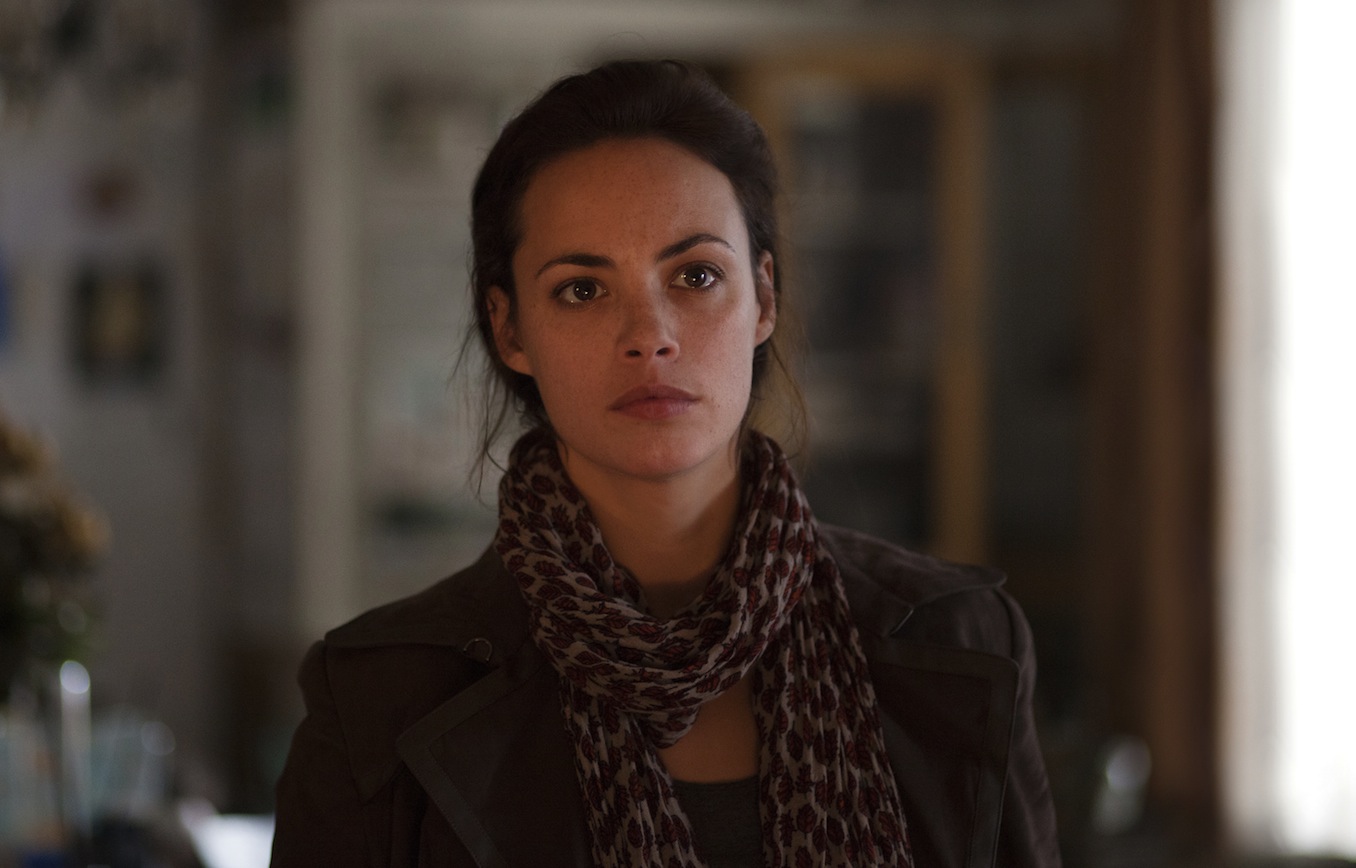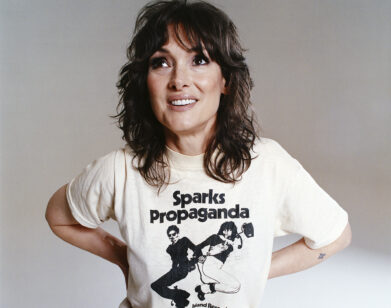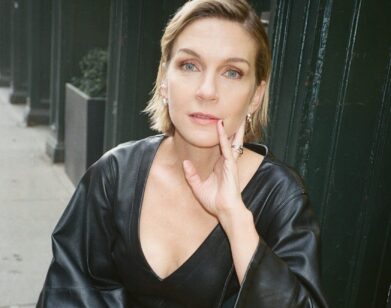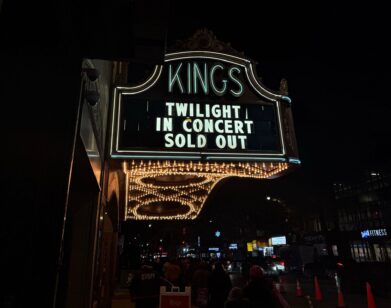Bérénice Bejo: Past, Present, and Future

ABOVE: BÉRÉNICE BEJO AS MARIE IN THE PAST. COURTESY SONY PICTURES CLASSICS
In the first scene of Asghar Farhadi’s The Past, a man and a woman meet in an airport on opposite sides of a glass partition, speaking and gesticulating in silence. The man, Ahmad (Ali Mossafa), returning to Paris after five years in his native Iran, meets the woman, his estranged wife, Marie (Bérénice Bejo). The silence, palpable, is full of things unspoken and not necessarily heard, understood, or even fully processed.
At the heart of Farhadi’s follow-up to his 2012 Oscar-winning A Separation is the intangibility of past experience and its latent effects, profound or otherwise, on our very tangible present. Marie initially requests Ahmad’s presence in France to legalize their divorce, so she can marry her new boyfriend, the still-married Samir (Tahar Rahim). But over the course of the film, certain fragmented details emerge—Samir and Marie’s affair coincided with, and perhaps incited, Samir’s wife to attempt suicide, leaving her in a coma. Already a mother to a teenage daughter and little girl, Marie attempts, without much effectiveness, to take on the role of Samir’s son’s mother. Ahmad, in town for a week and world’s away from his former life with Marie and her children, attempts to forge a reconnection.
Marie, played by the Argentine-born Bejo with a burning, burdened, and beautiful stoicism, is the fulcrum on which the narrative unfolds—striving to push herself out of the past, and into some unrealized, yet idealized, future. Bejo, last seen as the tap-dancing ingénue Peppy Miller in Michel Hazanavicius’ silent ode to ‘30s Hollywood, The Artist, won the Best Actress Award at this year’s Cannes Film Festival for her efforts as Marie. After working in a string of comedies—The Artist and the French James Bond parody OSS films, helmed by Hazanavicius (also her husband), plus this year’s Populaire—she’s found a way to explore, in full force, the psychology of a woman mired in pain and regret, but still pushing forward.
We recently caught up with Bejo by phone while she was in Paris.
COLLEEN KELSEY: I wanted to ask about the first scene of the film when Ahmad and Marie are meeting in the airport. I thought it was a really revealing way for the characters to be introduced, specifically Marie.
BÉRÉNICE BEJO: For the audience, who just saw me in The Artist, it was something that would connect with my past as an artist. The scene was written even before I got the part, so that was interesting. I remember shooting this scene and everyone was on the other side of the glass so I was very alone on my side. It was very emotional. I guess I love acting without words. And you can feel everything—the past is coming back to Marie. It’s amazing what we do in this scene: how do you deal with your past? How do you move on with your life? How you didn’t accept everything, you didn’t deal with everything, and you have to move on. And the movie is about that: how you have to move on even if some things are not quite finished or quite understood. I think everyone can connect with that.
KELSEY: I found Marie very hard to read. I couldn’t decide if she’s just a restless spirit, who’s never satisfied with what she has, or if every time she finds love with someone, she really believes it’s true happiness. There’s a storm beneath the surface with her, and the way you play her is very physical. Did Asghar want that physicality in your embodiment of the character?
BEJO: That’s interesting because when I worked on the character, I didn’t realize how much she can be unlovable and how cold she could be. Of course, when you work on a character, you try to understand her. You feel that everything she does has a reason. And when I saw the movie I was like, “Oh my god, she’s so unlovable in this scene! The way she acts is so not right!” But when I was acting, I was not thinking this way. A character is never entirely white or black, there’s never entirely right or wrong. You have to realize sometimes you face something, and then you change your mind, or then you realize you were wrong. Marie is this way, and it was hard for me to play sometimes, because I really disagreed with her. In the movie, you can tell the men are stuck in situations. She’s the one who’s like, “Okay, now we need to move on.” The guys are so held back with the past, they don’t want to move on.
KELSEY: What was the process working with Asghar, especially since he doesn’t speak French?
BEJO: We had a translator. What was really interesting was, we had two months of rehearsal. We worked maybe four days a week for two months, all the actors all together in a room reading our scenes or listening to the other scenes. Sometimes we were improvising; sometimes we were just sitting on chairs and trying to understand everything. So, at the end of the two months, the translator was there everyday, his voice was Asghar’s voice. It was kind of cool because, in a way, we would have to wait. We were just looking at his face, he was speaking but we would not understand him. But we could see his face and his eyes and his body language. And then you have the translation. So the translator was going a bit slower than normally; but, in a way, it was good because you were forced to listen to others. You know, you couldn’t just stop him, like, “No, no, no, no. I don’t agree.” You have to listen. We had a very amazing dialogue together.
He’s very precise, he’s very sweet. I remember one scene where I have to get very angry with my daughter. We spent two days doing this scene. The first day [the camera] was on my daughter, on my ex-husband, on everyone but me. And then the next day it was on me—the first day I was crying and yelling and everything was very emotional, and the next day it was very calm and I thought I was very bad. And Asghar comes to say, “Okay, we’ll move on. That’s good. You got it.” And I just start crying like a baby, like, “No, Asghar. This is not possible. I’m so bad. We cannot stop with this. We’ve been here for one day. I’ve been working so hard.” And he was looking at me and he starts almost crying and the crew was crying because I was very upset and very sad. And I remember his face, he look at me like, “Okay, Bérénice. Don’t worry. We’ll do it again. Don’t worry. Calm down. We’ll do it again.” We did it again and it was perfect. He comes back to me and says, “Come and see the monitor, I’m sure you’re going to like it. I’m sure we got it.” And I’m like, “No, no,” And then I go back to the monitor and I look at the scene and then I realize what Asghar wanted. We do this scene for one whole day, just tired, big actors’ stuff, and then we got that he really wanted something more subtle, not so intense. But, as an actor, you think you have to go really far and deep and cry and yell to be good in a scene. Sometimes that’s not the point. But that’s Asghar.
KELSEY: How did you find it to work on this film after working on comedies like The Artist, or Populaire, or the OSS films?
BEJO: It was great because every scene had a challenge and I was really happy to be able to be Marie. I was so proud that I was given this role, and that he believed that I could do that. When you see The Artist, I look so young and lovable and sunny and nice and beautiful. For an actor, you always want to get from one side to the other side, so it was just the best gift I could have after The Artist, especially for an American audience who don’t know me in films except The Artist. In France, people know me a bit from other things. But I was very proud that you, or [Cannes jurors] Steven Spielberg or Nicole Kidman, could see me in that kind of role at the opposite side of The Artist. It impressed people, of course. It’s very funny that The Past was very easy shooting because, as I said, we rehearsed it for two months and that was very hard. But then when we arrived on set, we knew each other so well, we’d been working for two months, we knew what to do and it was fun because we’d been working on everything 500 times but when we were on set it was just 1,001.
KELSEY: And winning the Best Actress prize at Cannes, I’m sure it was a surprise. What was your reaction?
BEJO: It was a surprise because—I have to be honest and kind of pretentious—I was hoping for something for the movie. I was hoping something for Asghar because he’s the leader of the movie: he wrote, he directed. I really respect directors, especially directors like Asghar. So when I got the prize, I was very surprised, I was like, “This cannot be for me because this is all thanks to Asghar.” That’s why I asked Asghar got to come on stage with me because I owe him so much.
KELSEY: I think a lot of people want to talk about your choice to do this movie after doing The Artist, which was such a big success in the U.S. After you finished that film, was there any expectation or interest in you coming to the U.S. and maybe doing a Hollywood movie?
BEJO: Yeah. I was and I still am interested in doing Hollywood movies because they are huge opportunities and things we don’t do in France. But, I have to be honest, I didn’t receive any very interesting propositions. I got a few ones were more, like, action movies and things like that. I want to do something else. I’m still waiting. And I will, someday. It didn’t happen. I’m optimist, so I hope people will see me in The Past because I think The Artist is such a special character and special movie. I hope The Past will be seen and will receive some attention overseas so that people—producers and directors—will think about me, but it didn’t really happen yet.
KELSEY: See, I’m always excited to speak to actresses who work in France about their roles because, more often than not, I think the roles for women are a little bit more complex and more in depth than in U.S. movies. I wonder if you agree or not.
BEJO: You know, I think French film has been very different. It’s more intimate. But really, we don’t do action, we don’t do science fiction—we don’t have the money to do those kinds of movies. But, for me, as a French actress, to be able to go and do some other movie, we always think about [it]. In France, it’s always about life, normal life. We always stick with these realistic things. So when French people are dreaming about American movies, they go and see the thrillers, and Westerns, and science fiction, huge entertaining movies. We do beautiful, small stories, more intimate experiences. Americans look at France, like, “Oh, they do very beautiful movies!” French look at Americans like, “Oh my god. They have so much money, they can do whatever they want!” What is good is that what Marion Cotillard is doing—she is going from one country to the other like what no one else is doing. And that’s great.
KELSEY: Would you ever consider doing a film in Argentina?
BEJO: I’ve received some propositions. I will definitely do it once. It’s very hard because you’re working in your own country with people that you know that you really admire. If I don’t have anything to do here, I’m like, “Okay, I’ll just jump, and I’ll go there.”
THE PAST OPENS IN LIMITED RELEASE THIS FRIDAY, DECEMBER 20.






